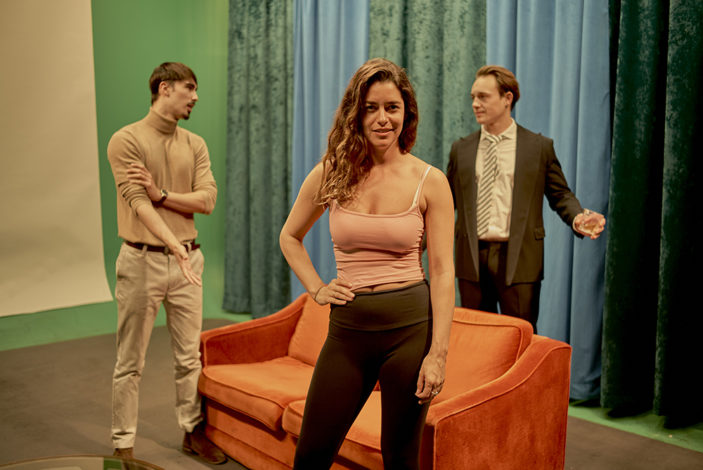
Trigger warning: this review contains discussions of sexual assault.
Spoiler alert: this review also discusses how the play ends.
Set in 1990s Boston, Spike Heels focuses on the intertwined lives of four individuals and one woman’s journey to self-actualisation. Written in 1992 by Theresa Rebeck and directed by Serhat Caradee, Spike Heels is based on George Bernard Shaw’s 1913 stage play Pygmalion, and when we first meet our protagonist Georgie (Jessica Saras) she’s bursting into her downstairs neighbour’s apartment on her way home from work, seething with justified rage. It makes for quite an entrance.
We soon discover that Georgie’s boss Edward (Joshua Horwitz) propositioned her and when she rejected his advances, he threatened to rape her.
Andrew (Antony Press), a mild-mannered writer and academic, is furious. Not only did he get Georgie the secretary job at the law firm but Edward is his close friend, his ‘buddy’, his ‘mate’. Initially you’d be mistaken for interpreting his rage as the response of a caring friend, but it quickly becomes clear that Andrew’s rage is a self-righteous display steaming from a place of jealousy.
It’s subtle at first but here we have the stereotypical ‘nice guy’, the ‘not all men’ troupe and a man who feels that all women need to be saved.
We also learn that in an earlier conversation between Andrew and Edward, the former gave his mate ‘permission’ to date Georgie, in fact, he actively encouraged him to make a move. “I thought you’d treat her differently cause she came from me”, he later says to Edward.
This hallmark move of the ‘bro code’ stems from the patriarchal belief that women are the property of men and that all it takes for a man to feel ok to proposition a woman is another man’s blessing, not her consent.
When we are introduced to Edward, it makes for an interesting contrast – on the one hand, we have a deeply sexist man but hiding it behind a veil of self-righteous anger, and on the other, a man who is blatantly misogynistic and offensive but doesn’t hide it.
In the second act we finally meet Andrew’s finance Lydia (Kate Hardy, who is given very little stage time) and we learn that Andrew has postponed their wedding. When he finally admits to being in love with Georgie, he suddenly assumes they will be together now, without asking her what she wants or how she feels.
In classic rom-com fashion, she sends him back to Lydia and chooses Edward. The play attempts to persuade you that Edward has changed and that Georgie is the one calling the shots in this new relationship, but let’s not forget, this is the man who THREATENED TO RAPE HER at the start of the play. A fact everyone seems to have conveniently forgotten.
Even knowing the source material of this play, it did not steam my deep frustration with this rom-com ending. The men in Spike Heels are never held accountable for their actions, in fact, you could argue that Edward is rewarded for his. This is deeply disturbing.
Spike Heels is brilliantly cast and each actor delivered an outstanding performance. In particular, Saras as Georgie was perfection on stage. Every woman in the room felt her rage because at some point every woman in the room has been in a similar position.
So convincing was the cast, there were moments where I fought the urge to heckle, to verbalise my frustration at the behaviours of self-entitled men who, at one point were lamenting about how life was so much easier when they could blame women for everything. I reminded myself it’s just a play – but is it?
Given the current climate we find ourselves in, where it seems every week a new politician is accused of rape or sexual assault, Spike Heels demonstrates that our society hasn’t come very far in the last 30 years. It’s uncomfortable that this play was marketed as a “comedic critique of the patriarchy” but made no real social commentary about how these women were treated.
At a time where on average one woman is killed a week by a current or former partner, is it really ok to present Rebeck’s play unedited? Is this not a missed opportunity? And should rape or sexual assault ever be played for laughs?
It’s easy to become overwhelmed by disappointment at this pseudo-feminist portrayal, but as the play closed I felt the collective frustration of the audience which was oddly satisfying. While it’s apparent that men’s attitudes toward women haven’t changed much, women’s acceptance of this behaviour has. Women don’t want the rom-com ending anymore – and this is where things actually have changed.
![]()
![]()
![]()
![]()
![]()
THREE STARS (OUT OF FIVE)
Reviewer attended on 19 May 2021.
Spike Heels is showing until 29 May at Fringe HQ Newtown. For more information and to book head to the website.
